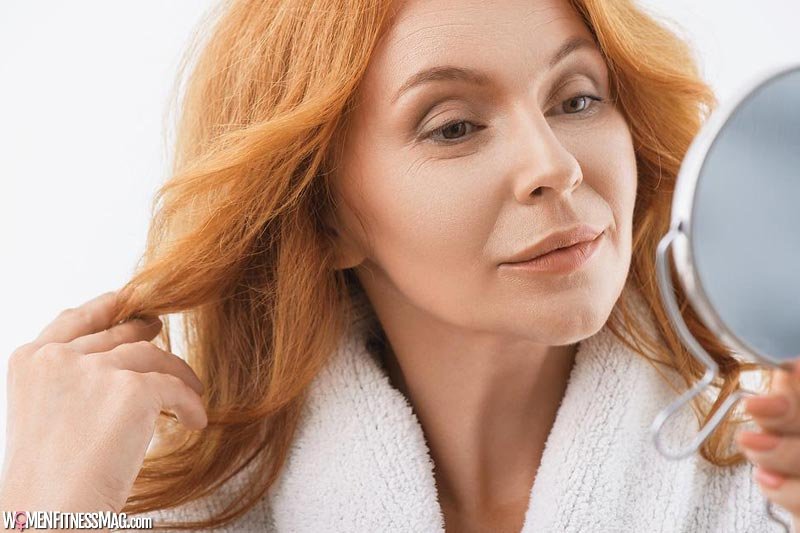Hormones That Grow Older Women Mature : Scientists claim that our body synthesizes about a hundred hormones and that 6 of them are important for female beauty. They contribute to the elasticity of the skin, preserve youth and even take care of a good mood.
Sometimes, however, hormone levels drop and a person begins to age prematurely. The good news is that there are reliable methods to restore the balance of hormones.
-
Estrogen
Estrogen causes fibroblast cells to produce collagen and elastin. When the level of this hormone decreases, wrinkles appear, the oval of the face becomes uneven and the breasts relax.
Reducing estrogen ages not only the skin but the body as a whole.
- How does estrogen levels rise?
Food. Soy tofu, soy milk, brown rice, flaxseed, fresh vegetables and fruits. Scientists claim that meat products suppress estrogen production, so it is better to reduce the consumption of animal protein. - Cosmetic products
Specifically creams that contain phytoestrogens. Licorice serums and creams fight aging because it contains liquiritigenin – an antioxidant that stimulates collagen production. - Food additives
Phytoestrogens are sold as dietary supplements in the form of red clover, oregano or cimicifuga.Although they are not hormonal drugs, it is necessary to consult a doctor before taking them.
- How does estrogen levels rise?
-
Growth hormone (somatotropin)
People tend to get somatopause with age – a condition in which the level of growth hormones in the blood begins to decline.
When somatotropin levels are reduced, muscle shrinks, fat and wrinkles begin to appear in excessive amounts, mood deteriorates, and endurance weakens.
Hollywood celebrities often inject growth hormones, but this method has many unpleasant side effects such as swelling, headaches and even uncontrolled growth of bones and internal organs. For more in-depth information about somatropinyou can go through HGHservice to understand how actually growth hormone work in human body.
How to naturally increase the level of growth hormones?
- Physical activity
Walking at a speed of 5 km per hour, exercise with weights (10-15 repetitions each). It is better if strength training is preceded by aerobic exercise – first work with weights, and then walking on the treadmill. - Temperature changes
Visiting a sauna or taking a contrast shower stimulates the production of growth hormones. - Sports supplements
Gamma-aminobutyric acid improves sleep and increases somatotropin levels.
- Physical activity
-
DHEA (dehydroepiandrosterone)
DHEA is a hormone that has a calming and anti-aging effect.
But it is produced by our body only until the age of 30. Then the muscle tone begins to fall, the vessels become more fragile and the skin loses its elasticity.
How to naturally raise its level?
- Include healthy fats in your diet – Our body produces DHEA from them. Nuts, seeds, fatty fish and avocados contain essential polyunsaturated fatty acids.
- Eat protein products for breakfast – they help fight mood swings and stabilize the nervous system at the beginning of the day.
-
Melatonin
Melatonin regulates our daily rhythms. In other words, it informs the body that it is time to rest.
All the processes of cell renewal occur during sleep and if they are disrupted, people begin to age prematurely. Lack of melatonin leads to wrinkles, hair loss and the formation of pigment spots.
How to increase melatonin levels?
- Food –Melatonin is found in bananas, tomatoes, rice and corn.
- Alcohol, smoking and caffeine are contraindicated
When you consume them, the production of this hormone stops.Some drugs such as beta-blockers, hypnotics and anti-inflammatory drugs have the same effect.
- Food additives
Melatonin can be taken in pill form and sold freely in pharmacies.Some experts say that we need to artificially restore the lack of melatonin after the age of 35. In any case, always remember to consult your doctor first.
-
Cortisol
High levels of the stress hormone cortisol lead to premature aging.
Depending on the type of skin, the negative effect of cortisol manifests itself in different ways – from gray complexion, to dry and flaky skin, to deep wrinkles and oiliness and acne.
This hormone breaks down collagen fibers and makes the skin sag.
How to reduce cortisol levels and stress?
- Drink enough water – Even minor dehydration increases the level of this hormone. And a little something like a glass of water will help you relax. Nutritional supplements with rose root reduce the level of anxiety and cortisol.
- Listen to good music -Scientists say that music therapy reduces stress levels.
- Meditation –literally causes our body to reduce cortisol levels without medication.
-
Insulin
Insulin increases blood glucose levels and when it gets out of control, early signs of aging appear on the skin. High sugar levels lead to wrinkles as well as sagging skin.
Due to the increase in glucose, a process called glycation (the binding of sugar molecules and proteins) works faster than it should at a certain age, leading to the breakdown of collagen and elastin. Then the elastic skin becomes fragile and dehydrated.
How to protect the skin from excess sugar?
- Consult a doctor to find out the level of sugar in your body.
- Cosmetic products. Creams and serums with retinoids (vitamin A and its derivatives) stimulate collagen production. These cosmetics should contain vitamins C and E and green tea – they all work as antioxidants. Use sunscreen daily, even in winter. The sun’s rays destroy the elastin fibers and contribute to rapid aging.
Related Videos about Hormones That Grow Older Women Mature :
hormone therapy for women aged 65 years and older
How Hormones Impact the Aging Process… and How We Can Deal with Them
Estrogen Levels In Women
Hormones That Grow Older Women Mature
female hormonal changes in 20s, female hormone levels by age, hormonal changes at 25 years old, hormonal imbalance symptoms in females, hormonal changes in old age, hormone imbalance after 60, aging changes in the female reproductive system, pituitary gland and aging,




